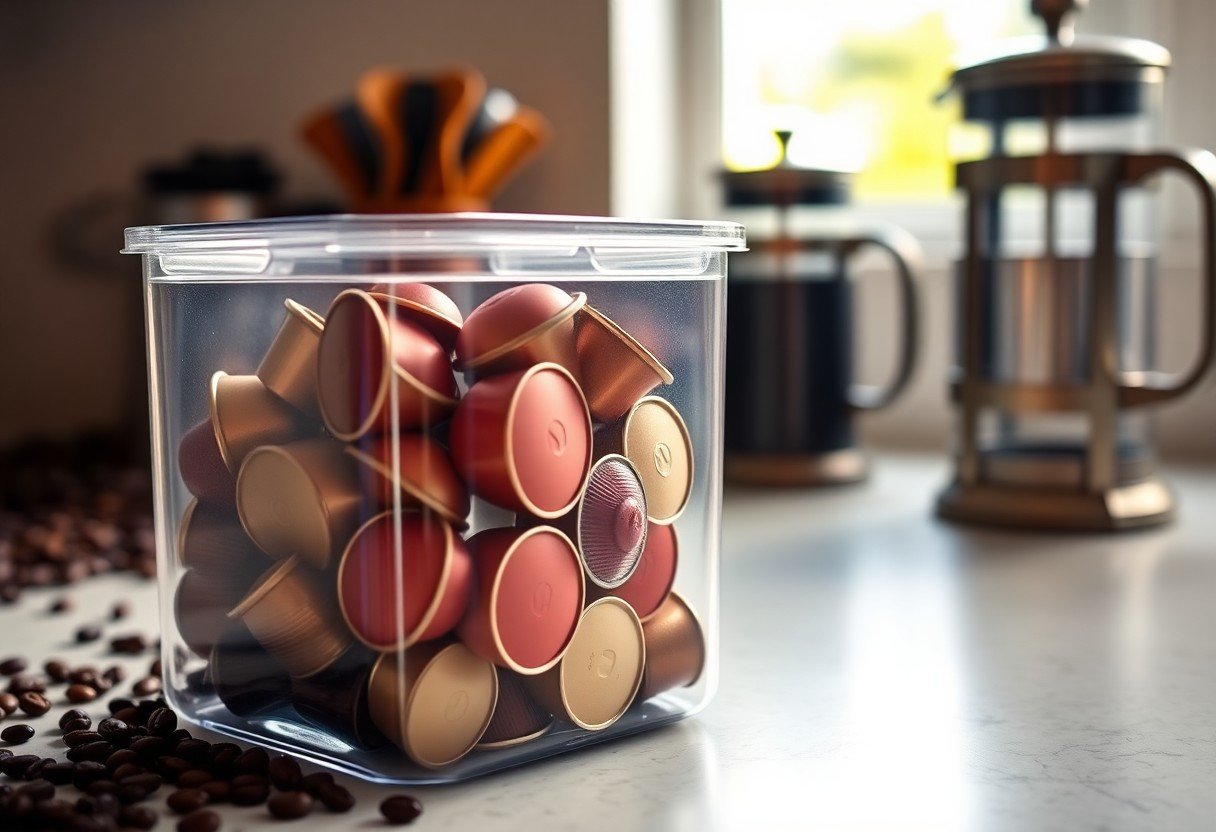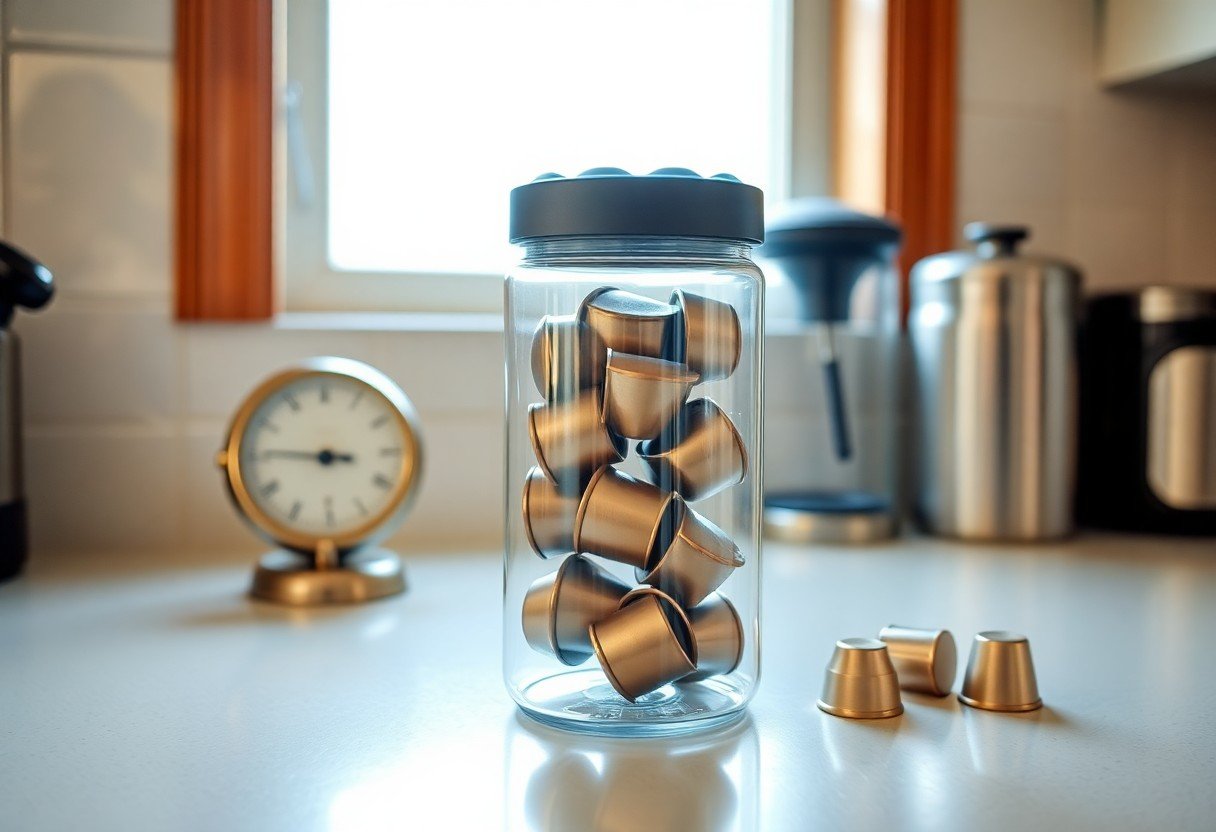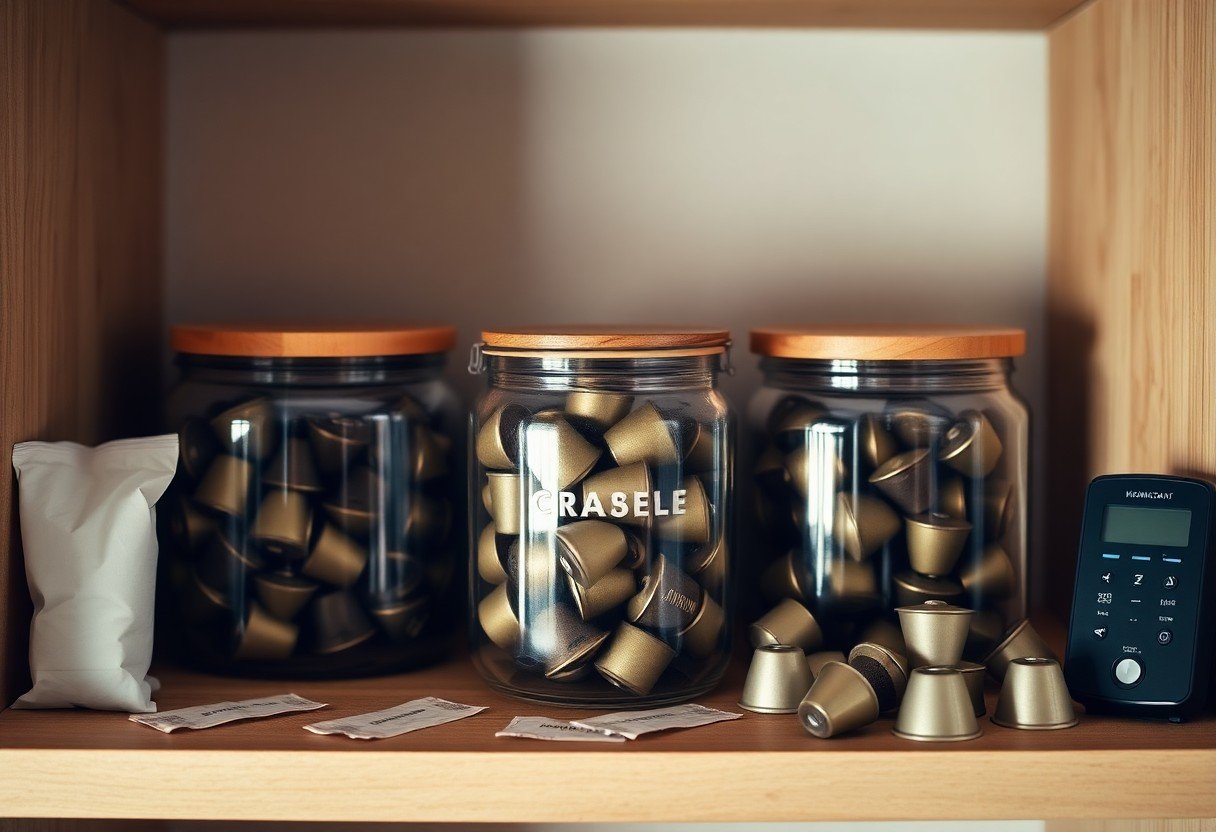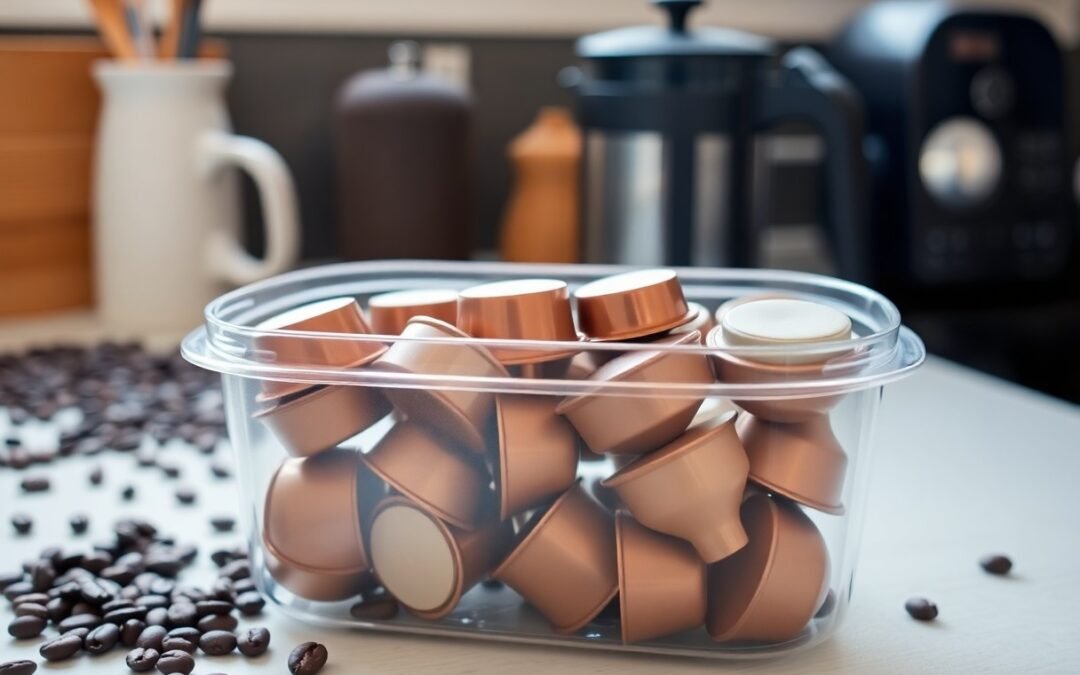Just like any other food product, proper storage is key to maintaining the freshness of your coffee capsules. By following a few simple guidelines, you can ensure that your capsules retain their rich flavors and aromas for as long as possible. From temperature control to the right containers, knowing how to store your coffee capsules can significantly enhance your daily brew. This guide will provide you with important tips to keep your coffee experience enjoyable, cup after cup.

The Crucial Role of Packaging
Impact of Packaging on Freshness
Packaging serves as the first line of defense against external factors that can compromise the freshness of your coffee capsules. The quality of the seal and the materials used directly affect how long the aromatic oils and flavors remain intact. Manufacturers often utilize multi-layer films designed to keep out oxygen, moisture, and light—elements that lead to degradation. For instance, nitrogen flushing is a common technique where nitrogen replaces the air in the package, creating a barrier to oxidation and preserving the coffee’s freshness for extended periods.
Your choice of packaging can greatly influence the longevity of your coffee experience. Opting for capsules that showcase airtight seals and UV protection ensures that the flavors are locked in, providing you with a rich, satisfying cup of coffee each time. Packaging innovations, such as resealable pouches or boxes, can also contribute to maintaining freshness beyond the original seal, especially if you consume your capsules over an extended period.
Identifying Quality Capsule Packaging
Quality packaging is identifiable by its structural integrity and protective features. Look for capsules that display certifications or endorsements from quality control organizations that vouch for their preservation capabilities. Transparent packaging materials that showcase the capsules can be misleading; the real value lies in how well they shield your coffee from light and air. Often, high-quality capsules are designed with specific color coding or branding that indicates premium processes and materials.
Examine the packaging closely for features like airtight seals, expiration dates, and storage guidelines. Quality manufacturers invest in research to optimize their packaging methods, which can mean the difference between a vibrant coffee experience and one that falls flat due to stale flavors. For detailed insights about how to keep your pods fresh and accessible, explore Coffee Capsule Storage Solutions: Keeping Your Pods ….

Environmental Enemies of Coffee Preservation
The Effects of Light and Air
Light and air are two of the most significant adversaries when it comes to preserving the freshness of coffee capsules. Exposure to light can cause the degradation of the oils and compounds that contribute to coffee’s flavor, leading to a stale taste. UV rays can break down the delicate compounds in coffee, thereby diminishing its quality. Similarly, oxygen can lead to oxidation, which not only affects flavor but can also result in a rancid aroma.
You can mitigate these effects by storing your coffee capsules in an opaque, airtight container. Keeping the capsules in their original packaging until use can further protect them from light and air, allowing you to enjoy a fresher cup every time.
Temperature Considerations for Optimal Storage
Temperature plays a vital role in the preservation of coffee capsules. Storing them in an area that is too warm can accelerate the degradation process and release the oils faster, diminishing the flavor profile over time. An ideal temperature range for coffee storage is between 60°F and 75°F (15°C to 24°C). Areas near ovens, windows, or heating vents can introduce fluctuations that are detrimental to your coffee’s freshness.
A steady environment is crucial; fluctuations in temperature can lead to condensation, which may harm the integrity of the capsules. By choosing a cool, dry place away from direct heat sources, you can significantly extend the life and quality of your coffee capsules.
Factors Affecting Temperature
| Factor | Impact on Coffee Preservation |
|---|---|
| Humidity | High humidity can lead to moisture buildup, causing capsules to degrade. |
| Proximity to Heat Sources | Heat can speed up oil decomposition and increase the chances of capsule damage. |
| Variability | Frequent temperature swings can lead to condensation within packaging. |
Choosing the right storage environment affects not just the temperature but also humidity levels and consistency, both of which are key to maintaining freshness. Avoid storage locations like kitchen cabinets that receive heat from appliances or any area with high humidity, such as near the sink. Instead, opt for a pantry or a cupboard that remains consistently cool and dry to protect the integrity of your coffee capsules.
Additional Temperature Insights
| Insight | Recommendation |
|---|---|
| Optimal Cooling | A fridge is too cold and can introduce moisture, while room temperature is ideal. |
| Storage Method | Use airtight containers that can withstand temperature variations without breaking down. |
Smart Storage Solutions for Coffee Capsules
Best Practices for Home Storage
Optimal storage for your coffee capsules begins with choosing the right environment. Keep them in a cool, dry place away from direct sunlight and strong odors, as these can alter the flavors and aromas. A pantry or a dedicated coffee shelf works best, ensuring they are stored at stable temperatures. Rotating your stock can also extend freshness; use the oldest capsules first and stock new ones at the back.
Additionally, avoid storing them in humid areas like kitchens near the stove or sink. Air-tight containers are beneficial for any capsules that have been opened, as they prevent exposure to moisture and air. Labeling containers with the date of purchase can help you track freshness and usage, making your coffee routine effortless.
Innovative Storage Containers and Accessories
Exploring innovative storage options can enhance your coffee capsule experience. Specialized drawer organizers or multi-tiered racks designed for capsules maximize space and make selection an enjoyable process. Some designs even feature transparent sections, allowing you to see your collection at a glance while minimizing disturbance of the remaining capsules.
For the tech-savvy coffee lover, smart storage solutions such as app-connected capsule dispensers can streamline your brewing process. These devices can track your inventory and alert you when stock is low, ensuring you never run out of your favorite blends.
Investing in magnetic or wall-mounted storage solutions can also save counter space while presenting your capsules beautifully. They come in various designs and styles, allowing you to showcase your collection aesthetically. This not only keeps your capsules organized but also adds a decorative element to your kitchen or coffee nook.

The Importance of Inventory Management
Effective inventory management ensures that you always have fresh coffee capsules at your disposal, enhancing your coffee experience. Tracking what you have, how long it will last, and the flavors you enjoy most can streamline your selection process and prevent waste. A well-organized inventory not only allows for easy access but also helps you avoid the pitfall of letting your favorite varieties go stale.
Keeping Track of Capsule Expiry Dates
Monitoring the expiry dates of your coffee capsules is important to maintain freshness. Most capsules will have a printed date, indicating when they should be consumed by for optimal flavor. Keeping a simple spreadsheet or a mobile app to log these dates can help you visualize which capsules need to be used first. This method keeps your coffee habit enjoyable without the disappointment of stale brews.
Rotating Stock for Maximum Freshness
Implementing a stock rotation method ensures that you consume your oldest capsules first, maximizing their freshness. As you acquire new capsules, place them at the back of the storage area and move older stock to the front. This method, known as “first in, first out,” is widely used in inventory management and can also be applied to your coffee collection. Not only does this technique help maintain the taste and aroma of your drinks, but it also allows you to explore the full range of flavors in your collection over time.
A simple visual reminder, such as labeling your storage container with the purchase dates, can enhance your rotation process, making it easier to grab the oldest capsules first. By doing so, you contribute to a more satisfying coffee ritual and reduce the likelihood of waste, ultimately saving you money and keeping your coffee taste exceptional.
Taste and Quality: How Storage Choices Make a Difference
Flavor Degradation Over Time
Flavor in coffee capsules deteriorates due to exposure to air, light, and moisture. Over time, volatile compounds responsible for the rich taste can break down, leading to stale or flat coffee. Studies have shown that once a sealed capsule is opened, its flavor can start to decline within just a few days, especially if not stored properly. You might notice a significant difference between a freshly sealed capsule and one that has been exposed to less-than-ideal conditions.
Even in unopened capsules, the best-by date indicates a peak flavor period, but this doesn’t guarantee freshness beyond that point. Properly storing them away from light and temperature fluctuations can extend their lifespan. Using opaque, airtight containers can help shield your capsules from environmental factors, preserving their intended flavor profile for a longer duration.
Experimenting with Different Storage Methods
Trying various storage methods can reveal which works best for your coffee capsule collection. Some enthusiasts find success with vacuum sealing, while others prefer glass jars known for their airtight properties. Experimentation can lead to discovering combinations of storage techniques, like desiccants with airtight containers to combat moisture, proving beneficial in enhancing flavor retention.
Different storage options can produce surprising results. For instance, utilizing a cool, dark pantry might outperform countertop storage, affecting not just freshness but the overall coffee experience. Documenting your findings will allow you to identify the most effective method for your specific environment and tastes, ensuring that each cup of coffee delivers the flavor and quality you desire.
Summing up
So, storing your coffee capsules properly is crucial for preserving their freshness and flavor. You should keep them in a cool, dark place away from direct sunlight and moisture, as these elements can degrade the quality of your coffee. Airtight containers are ideal for preventing exposure to air and helping to maintain the original aroma and taste of the coffee inside the capsules.
Additionally, organizing your capsules by type or flavor can make it easier for you to access your coffee options while ensuring that you use them before their expiration date. By implementing these storage practices, you can enjoy a consistently rich and flavorful cup of coffee each time you brew, maximizing your coffee experience in the long run.
FAQ
Q: What is the best way to store coffee capsules?
A: Coffee capsules should be stored in a cool, dry place away from direct sunlight and moisture. An airtight container can help maintain freshness.
Q: Can I freeze coffee capsules to extend their shelf life?
A: Freezing coffee capsules is not recommended as it can cause condensation when removed from the freezer, affecting the capsules’ integrity and flavor.
Q: How can I tell if my coffee capsules have gone bad?
A: Signs of stale coffee capsules include a loss of aroma, changes in flavor, or visible damage to the packaging. If the coffee tastes flat or off, it’s best to replace them.
Q: Is it necessary to keep coffee capsules in their original packaging?
A: Keeping coffee capsules in their original packaging protects them from air and moisture, which helps preserve their flavor. If transferred, use airtight containers.
Q: How long do coffee capsules typically last when stored properly?
A: When stored in optimal conditions, coffee capsules can last for several months to a year. Always check the expiration date on the packaging for guidance.

